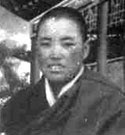
Phuntsog Nyidron
In 1989, Phuntsog Nyidron was charged with “counter-revolutionary” crimes when she and five other nuns held a peaceful demonstration in celebration of the announcement that the Dalai Lama had been awarded the Nobel Peace Prize and to protest the Chinese occupation of Tibet. She was given a nine-year sentence. Her sentence was extended eight years after recording songs with 13 other nuns about their devotion to Tibet and the Dalai Lama. It was then reduced by a year for showing “signs of repentance.”
“Phuntsog Nyidron’s release is wonderful news, but no real substantive change has taken place towards greater freedom for Tibetans in Tibet,” said former political prisoner Ngawang Sangdrol, who was jailed in Drapchi Prison for 11 years with Nyidron. “The lack of freedom in Tibet is especially dire for former political prisoners. I can say from my own experience that this is precisely the situation in which Phuntsog Nyidron will now find herself,” Sangdrol continued.
News of Nyidron’s release came the day after the US State Department released its annual human rights report that found China guilty in Tibet of “serious human rights abuses, including execution without due process, torture, arbitrary arrest, detention without public trial, and lengthy detention of Tibetans for peacefully expressing their political or religious views.” The Bush Administration has publicly hinted that it could sponsor a resolution critical of China’s human rights record at the upcoming meeting of the UN Commission on Human Rights in March. The European Union is also closely watching developments in China in advance of the Commission’s session.
“Even a one-year reduction in sentence is important for Phuntsog; she has suffered so long. But this last minute maneuver to curry favor on the eve of the Human Rights Commission is callous on China’s part,” said Mary Beth Markey, ICT Executive Director.
“Phuntsog Nyidron was imprisoned unjustly, denied due process, and tortured in prison. This release – viewed against the background of the new State Department Human Rights Country Report on Tibet – is clearly part of China’s effort to use political prisoners as bargaining chips in place of systemic reforms,” Markey concluded.
On Feb. 3, 2004, the U.S. House of Representatives passed House Resolution 157, calling on China to release immediately Phuntsog Nyidron and all Tibetan prisoners of conscience. Rep. Tom Udall (D-NM), the bill’s sponsor, said of the wide support for the resolution, “If the Chinese government thinks the United States is eventually going to give up on these prisoners they are wrong. We keep a close watch on the status of Tibetans and the human rights violations there, and will continue to do so. The passage of this resolution illustrates just that.”
Rep. Eni Faleomavaega (D-AS) said at the time of the resolution’s passage, “Some day, Tibetans will regain their freedoms and those who languished in Tibetan prisons will be celebrated as heroes.”
According to the Tibet Information Network, based on information available, there are approximately 150 sentenced political prisoners being held in Tibet, and 75 percent of them are monks and nuns. There are no reliable figures on the number of Tibetans who are detained by the Chinese government for months or years on political charges, as many are never formally tried and sentenced.

